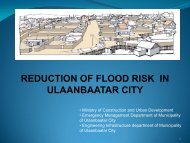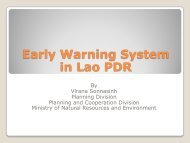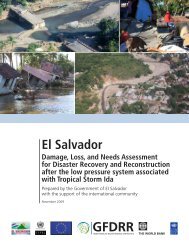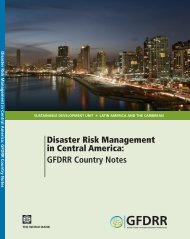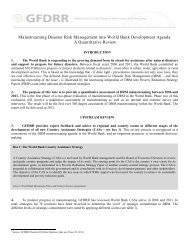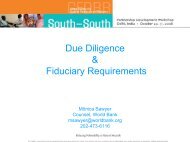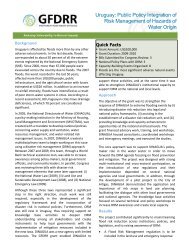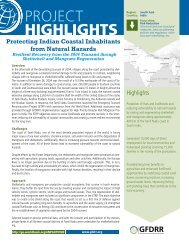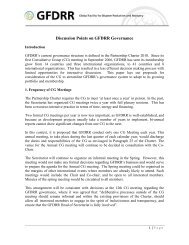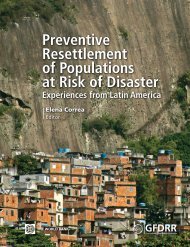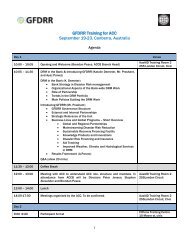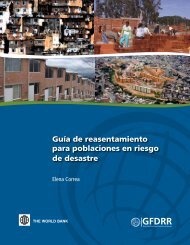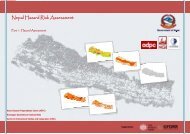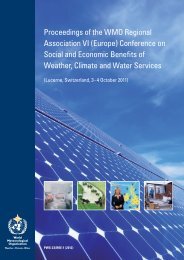Haiti Earthquake Reconstruction Knowledge Notes from ... - GFDRR
Haiti Earthquake Reconstruction Knowledge Notes from ... - GFDRR
Haiti Earthquake Reconstruction Knowledge Notes from ... - GFDRR
You also want an ePaper? Increase the reach of your titles
YUMPU automatically turns print PDFs into web optimized ePapers that Google loves.
40 | <strong>Haiti</strong> <strong>Earthquake</strong> <strong>Reconstruction</strong><br />
flict (Peru). Effectively addressing these issues<br />
up-front facilitates reconstruction.<br />
■■ In Peru, ambiguities and gaps in the titling system<br />
(e.g., the failure of homeowners to seek<br />
separate titles for their buildings) resulted in<br />
frequent legal disputes.<br />
■■ Following the Ica <strong>Earthquake</strong>, a system of government<br />
vouchers for housing reconstruction<br />
was developed, but it soon became mired in<br />
dispute due to widespread lack of formal titles.<br />
■■ Policies intended to provide communities with<br />
tenure security were poorly disseminated and<br />
overly bureaucratic, therefore underutilized by<br />
poor communities.<br />
■■ The World Bank-supported National Land<br />
Rights Project was launched, and is now in its<br />
second phase.<br />
■■<br />
In Madagascar, the recent Programme National<br />
Foncier was faced with an outdated and<br />
largely untitled land system. Communal land<br />
tenure offices were created (many were mobile<br />
and under government contracts) to verify and<br />
validate simple tenure certificates. This system<br />
allowed land certificates to be issued after only<br />
200 days and at US$24 per unit. ii<br />
Indonesia<br />
Lessons <strong>from</strong> Aceh illustrate some of the options<br />
the government might wish to consider.<br />
Land tenure in post tsunami Indonesia was<br />
characterized by a similar state of affairs.<br />
Few parcels were titled and most records were destroyed<br />
in the disaster itself.<br />
The government agreed to restore land tenure<br />
through a multi tiered community-led<br />
process. The first project financed under reconstruction<br />
focused on land administration. Local<br />
communities, with support <strong>from</strong> NGOs and the<br />
national Land Administration Agency (BPN), conducted<br />
land inventories in accordance with BPN<br />
guidelines. BPN verified the results by measuring<br />
the parcels and validating community agreements<br />
on ownership and boundary demarcation. The results<br />
of this adjudication were publicized for four<br />
weeks, whereupon the properties were registered<br />
and titles issued. These services were provided free<br />
of charge. This process facilitated the reconstruction<br />
of housing and infrastructure, with community<br />
mapping of over 200,000 parcels of land and<br />
formal titling of over 100,000. The project also<br />
established a state-of-the-art land administration<br />
database to prevent future loss of documentation.<br />
Key land administration buildings destroyed by the<br />
tsunami were rebuilt.<br />
Progress with titling and housing reconstruction<br />
could not be achieved simultaneously.<br />
Rather, the issuance of a title generally followed<br />
construction. The CDA approach allowed construction<br />
to proceed with a high degree of confidence<br />
that houses were indeed on the correct plots and<br />
in accordance with land rights.<br />
Many families chose to informally subdivide<br />
their plots to enable the building of new<br />
houses for family members on the resulting<br />
“sub-parcels.” Many of these were subsequently<br />
titled under RALAS or another government program.<br />
The tsunami exacerbated impediments to<br />
women’s access to land. A system was created<br />
to address women’s limited ownership rights to<br />
land registered under the names of their husbands<br />
or fathers. Mobile teams <strong>from</strong> Shari’a courts accompanied<br />
the BPN land adjudication teams to<br />
tsunami-affected communities to reinforce religious<br />
principles of guardianship and inheritance<br />
and to encourage women’s land ownership and<br />
rights under Shari’a.<br />
Vulnerable groups need special support. Less<br />
effectively addressed issues included resettlement<br />
assistance for those rendered landless by the tsu-



